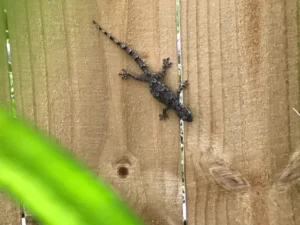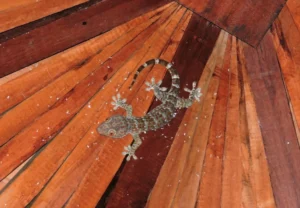Geckos are some of the noisiest lizards you’ll ever come across. Most reptiles stay totally quiet, but geckos chirp, click, bark, and squeak all the time. If you’ve ever wondered what all that racket is about, you’re not alone. So why do geckos make all these sounds?
Geckos make noise to communicate with each other. They use different sounds to mark their territory, attract mates, warn off rivals, show fear, and call to their babies. Each type of sound carries a specific message that other geckos understand.
Unlike most other lizards, geckos have vocal cords. That lets them make a ton of different sounds. This makes them different from other lizards and really helps them survive.
Some geckos can even change how their calls sound depending on the situation, almost like they’re speaking different “dialects.”
Geckos Are the Most Vocal Lizards
Out of more than 6,000 lizard species, geckos are the nosiest. Other lizards might hiss now and then, but geckos have a full range of sounds.

The name “gecko” actually comes from the sound they make. In many Southeast Asian languages, the word sounds like the chirps these lizards produce.
People noticed the nighttime chatter long before scientists even started studying it.
Geckos use sound as their main way to talk to each other. This helps them live in lots of places. They can communicate even when it’s dark, crowded, or noisy around them, which most other lizards can’t do.
Some geckos, like tokay geckos, have really loud calls that carry far. In the wild, this helps males warn rivals across trees, rocks, and streams without having to fight.
Geckos Make Noise to Protect Their Space
One of the main reasons geckos make noise is to defend their space. Male geckos, especially, are serious about keeping other males away.
When a gecko finds a good spot with food and shelter, he’ll start chirping to show the area is taken. This tells other males to stay away and keeps fights from happening.
If another male ignores the warning and comes in anyway, the resident gecko will make louder barks or harsh clicks that basically say, “back off now.”
In some species, the strength of the call can even show how strong or healthy a gecko is. Other males can hear this and decide whether it’s worth fighting or just finding another spot.
These calls aren’t just about scaring rivals. They also let females know which males have the best spaces. A gecko with a strong territory is usually more attractive to females.
Male Geckos Make Noise to Attract Females
Male geckos also use sound to find females. These mating calls are different from the territorial ones; they’re usually softer, more rhythmic, and repeated over and over.

A male will sit in his space and call out, hoping a female nearby will hear him. The quality of his call matters a lot. Calls that are steady, deep, and consistent show that the male is strong and healthy.
Research shows female geckos prefer males with deeper, consistent calls. Some males even change their calls if other males are calling nearby, like a friendly competition to see who sounds best.
Mating calls can go on for hours during peak season. In tropical areas, it’s normal to hear several males calling all night, each trying to attract females while keeping rivals away.
Different Sounds Mean Different Things
Geckos don’t just make one sound, they have a whole bunch. Chirps are the most common, quick high-pitched clicks that are easy to miss if you’re not paying attention.
Barking usually means aggression or alarm. If a gecko feels threatened or wants to scare off a rival, it’ll make a loud, harsh bark. Sometimes a bark is so sudden it can even startle people.
Squeaks or screams happen when geckos are really scared. Pick up a gecko that doesn’t want to be held, and you might hear a high-pitched squeal.
Some species have squeals that sound almost musical, which can confuse predators or warn other geckos that danger is near.
Other sounds, like low grunts or chirp combos, can mean subtle things like “I’m here” or “stay close.”
Each species has its own mix, and some geckos even change their sounds depending on who they’re talking to.
How Do Geckos Make Sounds?
Geckos make sounds with their vocal cords, kind of like how we talk. They push air from their lungs past these cords, which vibrate to make sound.

Geckos can change the sound by adjusting how much air they push and how tight they make their cords.
Smaller geckos make higher-pitched sounds, while larger ones make deeper tones that travel farther.
Even though their vocal system is simpler than ours, geckos can still make complex sounds. Some can even produce two notes at once, making it sound like a little duet from one tiny lizard.
Do Baby Geckos Make Sounds?
Yes, even baby geckos chirp. They use soft chirps to talk to their moms and siblings.
Some mother geckos actually respond to their babies, which is unusual for reptiles.
Most reptiles don’t care for their young at all, but some geckos stick around for a little while, answering chirps or checking on them.
Baby geckos also practice their calls as they grow. You might hear quiet, clumsy versions of adult calls as they learn to talk. This helps them survive later.
Knowing when to call, squeak, or stay quiet can save them from predators.
Why Some Geckos Are Louder Than Others
Not all geckos make the same amount of noise. Some are really loud, others are pretty quiet.
House geckos, which live near human homes in tropical areas, are some of the loudest. Their chirps can go through walls and last for hours at night.

People in Asia or Africa often fall asleep to the constant chorus of geckos outside.
Leopard geckos and crested geckos, popular pets, are much quieter. They still make sounds, but softer and less often. This is why they make good pets; they won’t keep you up at night.
Even so, careful listeners might notice soft squeaks or small chirps when they hunt or interact with other geckos.
Geckos Signal Trouble With Loud Calls
If a gecko gets grabbed by a predator or feels like it’s about to die, it might make a loud distress call. This one is urgent and high-pitched.
These calls can startle predators enough to make them let go. They also warn other nearby geckos. Some scientists even think these calls might attract other predators, giving the gecko a chance to escape in the confusion.
Distress calls are basically an emergency alert. Other geckos seem to get it instantly.
Geckos Make Quiet Clicks While Hunting
Many geckos make soft clicking sounds while hunting. These are different from their other sounds; quieter and irregular.

Scientists aren’t 100% sure why. Some think it helps them find prey in the dark, like bats use sound. Others think it’s just an automatic sound that comes from focusing on the hunt.
Clicks might also show excitement or readiness to attack. Geckos seem to click more when prey moves fast or right before they strike.
Social Sounds Keep Groups Together
Some geckos live in groups and use sounds to stay in touch. These calls let them know where everyone is without seeing them.
Group geckos might chirp back and forth like a conversation. These calls help keep the group together and may even strengthen bonds.
In thick forests or rocky areas, these calls are really important for not getting lost.
Young geckos learn calls by listening to adults. If a baby grows up without hearing others, it might not learn the right sounds, which could hurt its chances of surviving.
Are Male Geckos Noisier Than Females?
In most species, males make way more noise than females. That makes sense; they defend territory and call for mates.
Females can make sounds too, but they stay quieter. They might chirp softly if a male calls, or make sounds if annoyed or scared.
Some females have subtle calls to show they’re ready to mate, but usually only nearby males hear them.

During breeding season, the difference is obvious. Males chirp constantly, while females mostly stay silent. It’s almost like males run the night’s “sound show.”
Male Geckos Use Noise to Avoid Fights
Noise actually keeps geckos safe. When a male calls, other geckos hear the warning and stay away.
This stops fights, which can be dangerous. A fight could mean losing a tail, getting hurt, or even dying. Using sounds lets geckos figure out who’s strongest without anyone getting hurt.
Usually, the louder, deeper caller wins without fighting. This sound system helps them live together safely.
Do Pet Geckos Make Noise?
If you have a pet gecko, you’ll hear it sometimes. How much depends on the species and the gecko’s personality.
Most pet geckos are quiet during the day when they sleep. At night, you might hear soft chirps or clicks as they move around. Some might even call after you if they’re curious or want attention.

Geckos kept alone are usually quieter than wild ones because they don’t have other geckos to talk to. But they’ll still make sounds sometimes, especially if stressed or during breeding season.
Even a quiet gecko might surprise you with a sudden bark if startled.
Conclusion
Geckos make noise because it’s their main way to talk. Every chirp, click, and bark has a meaning, whether it’s defending space, attracting a mate, or warning of danger.
This makes geckos really special among lizards. Most reptiles rely on body language or looks, but geckos have become the chattiest lizards on Earth.
Some even have different calls for hunting, distress, or social bonding, showing how flexible their communication is.
Next time you hear a gecko making noise, remember, you’re listening to a conversation.
Those sounds might seem random, but they’re actually a tiny, secret language geckos have been using to survive for millions of years.
Hi, my name is Ezra Mushala, i have been interested animals all my life. I am the main author and editor here at snakeinformer.com.

